ICTs for Rural Development An Integrated Approach

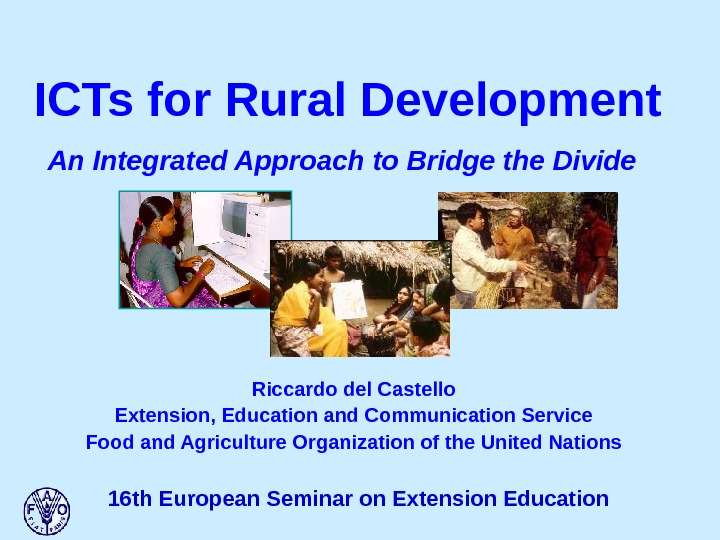
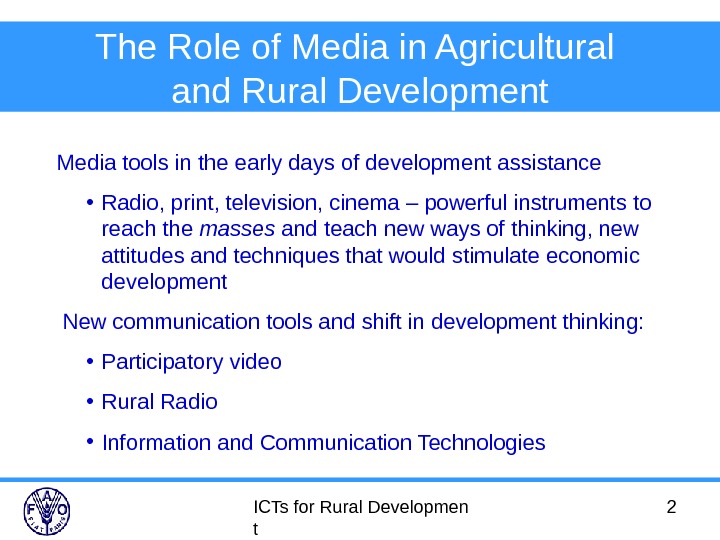
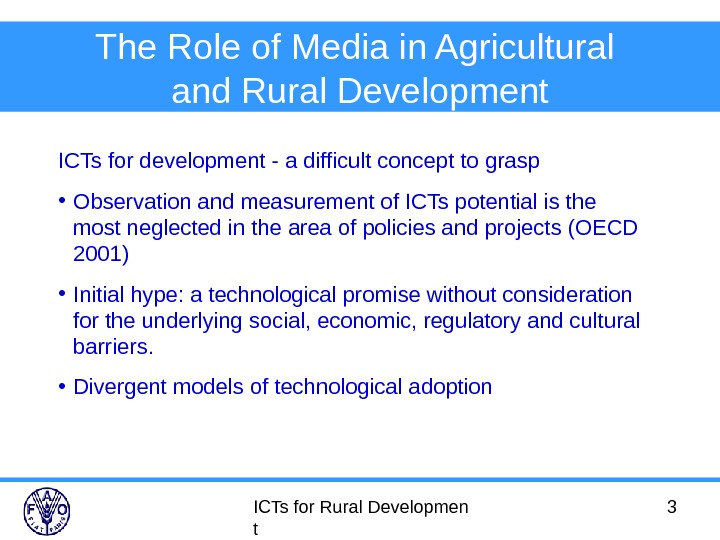
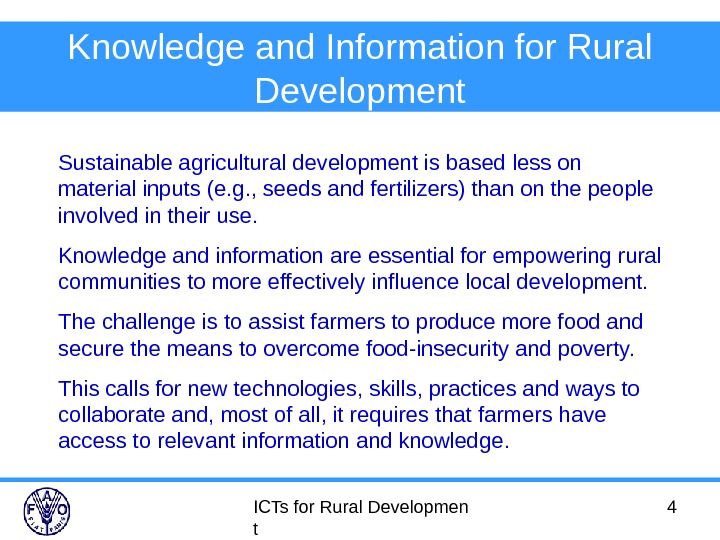
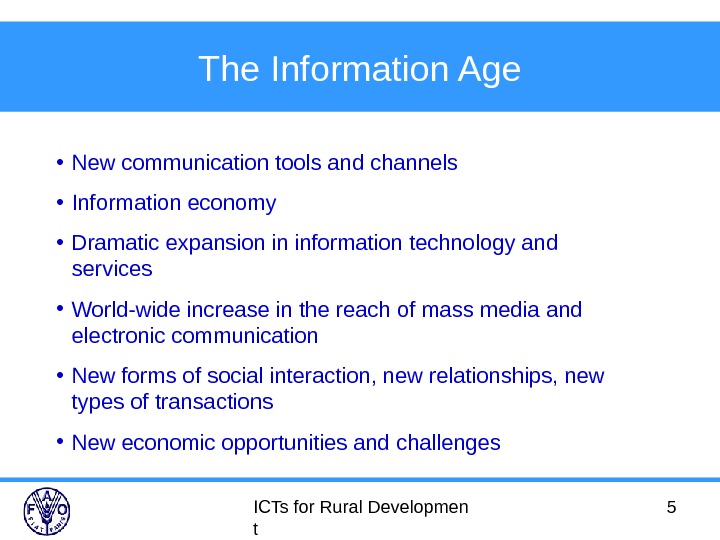
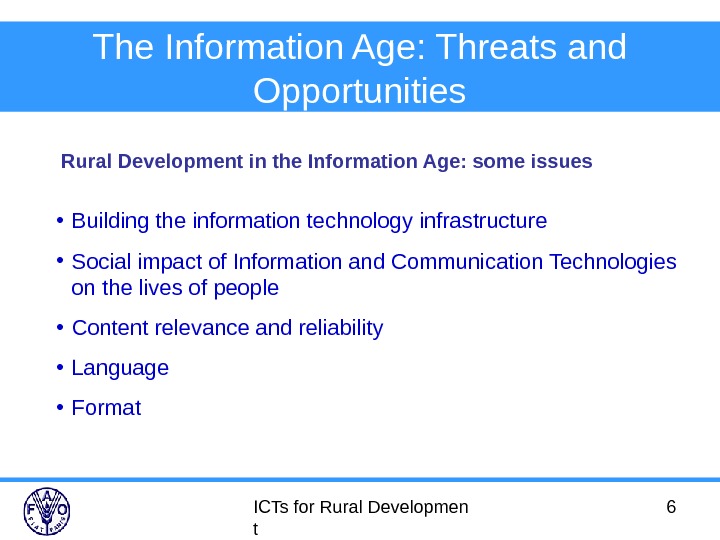
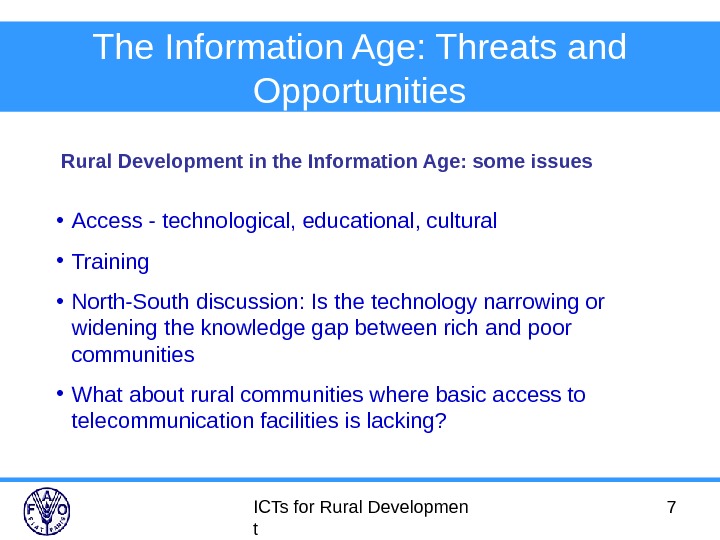
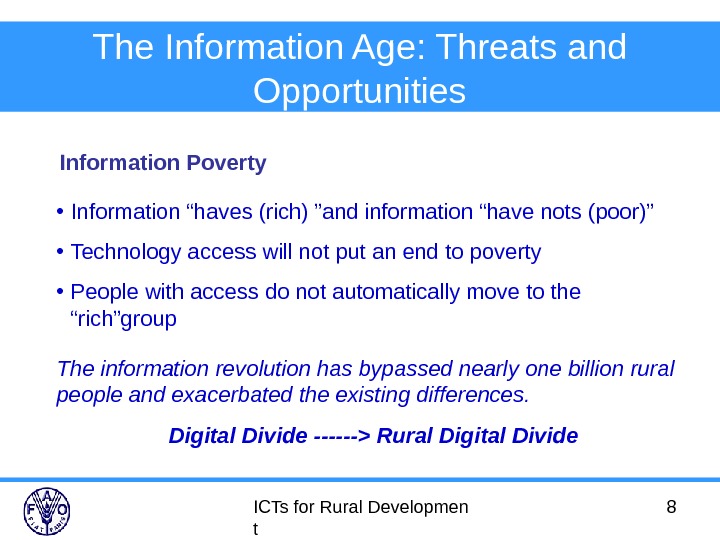
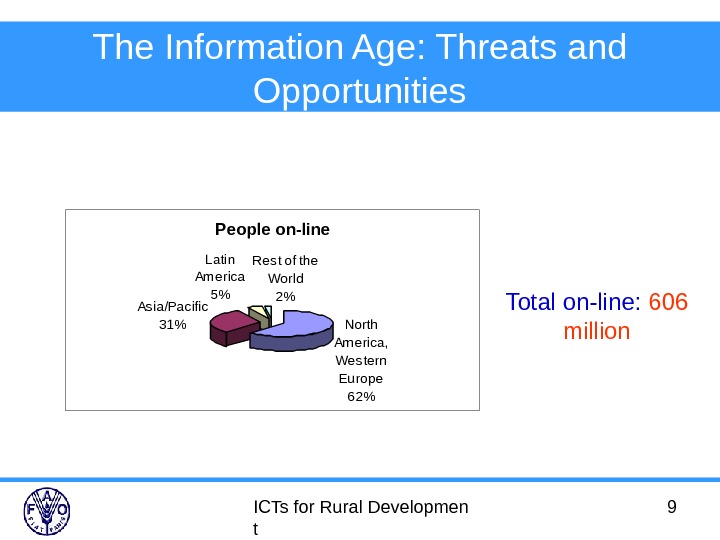
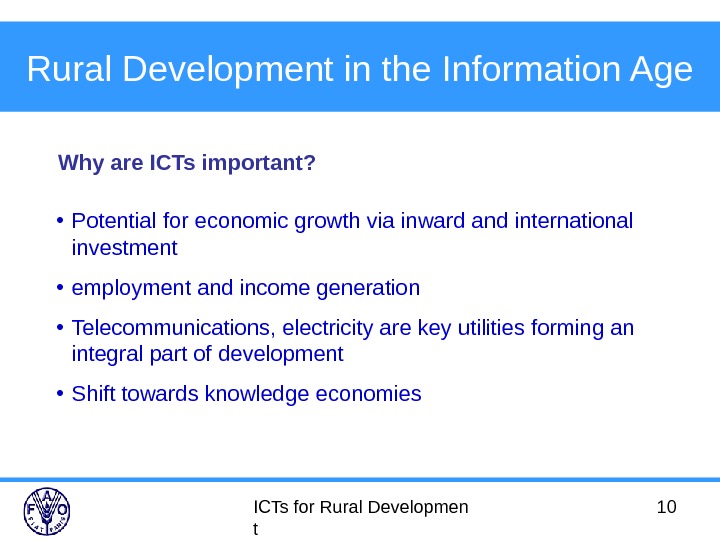

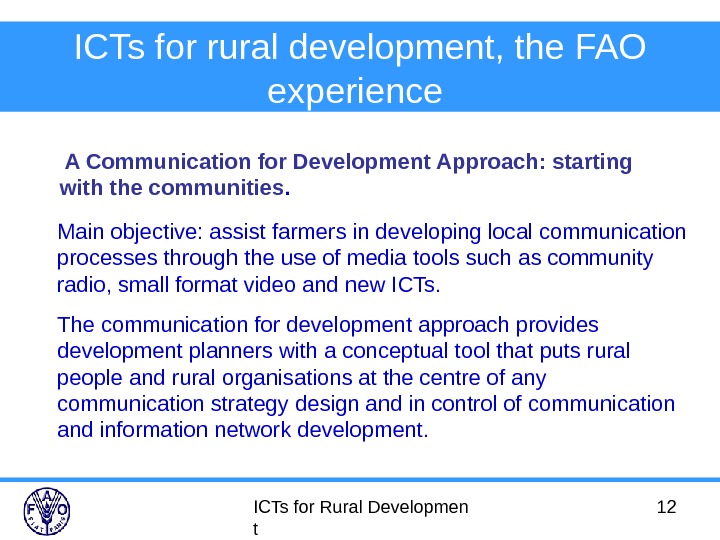
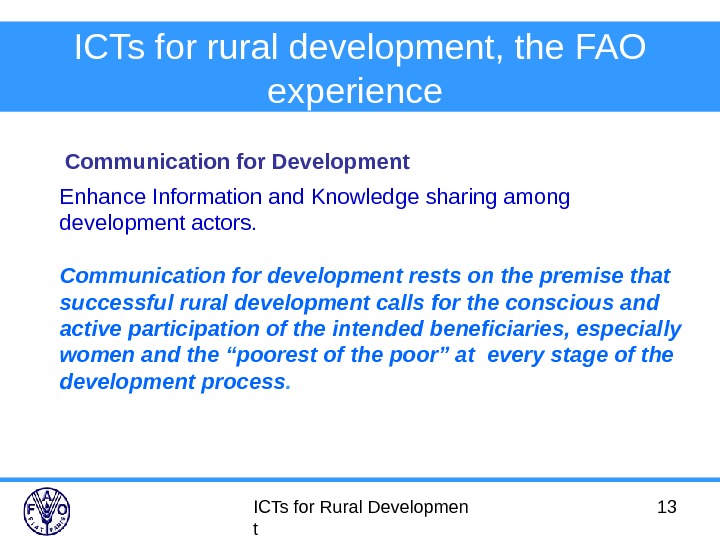

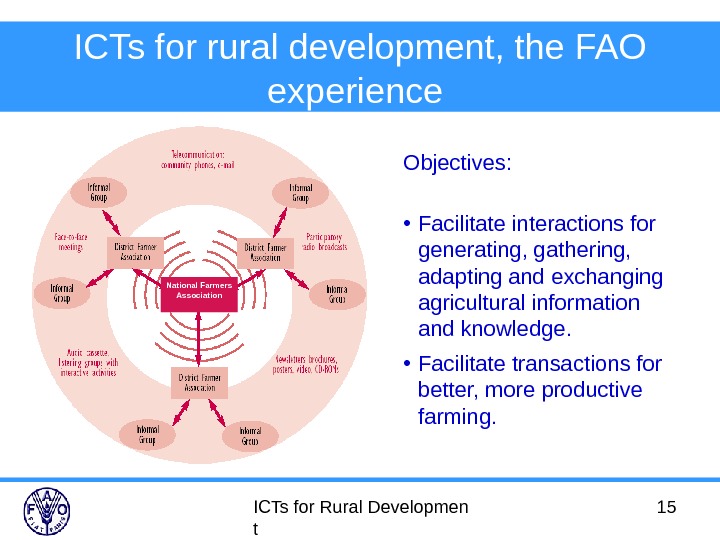
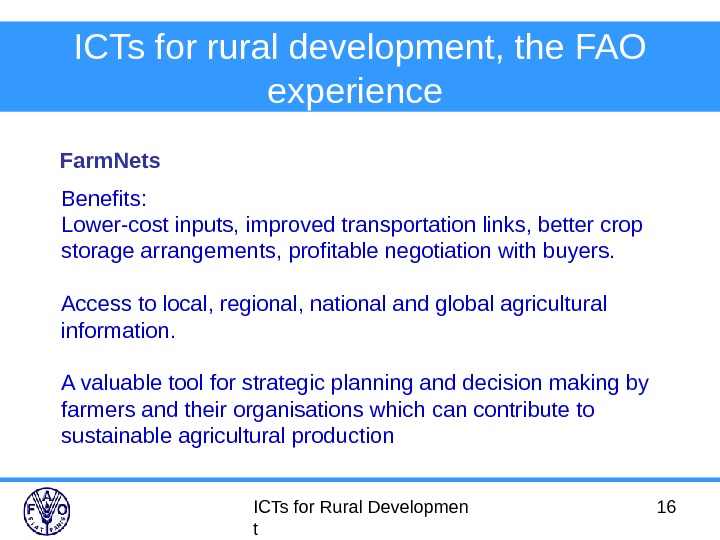


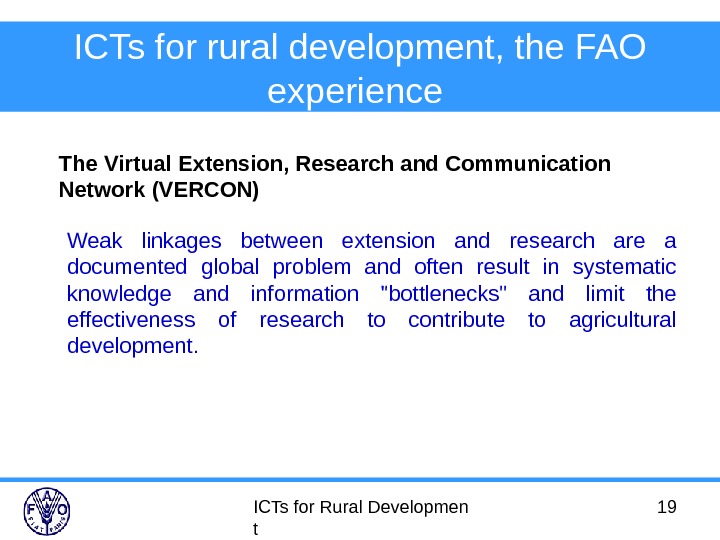

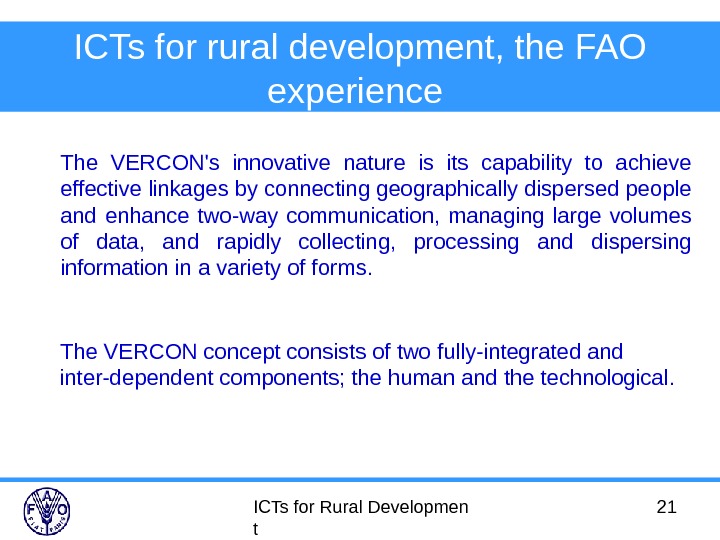
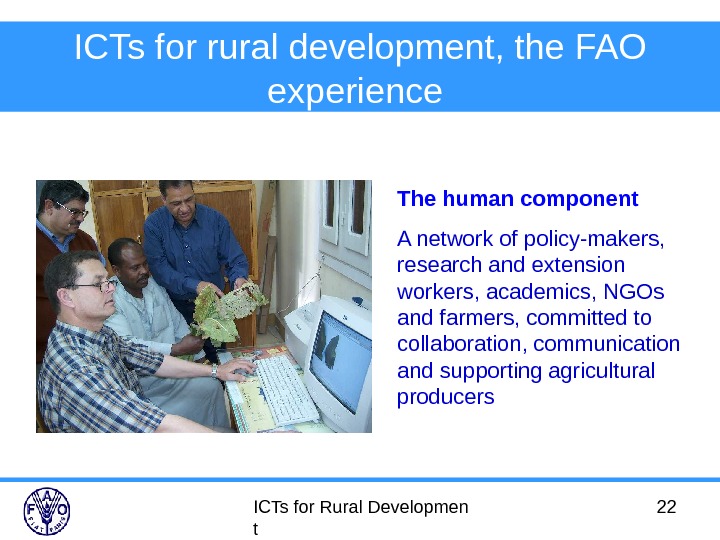
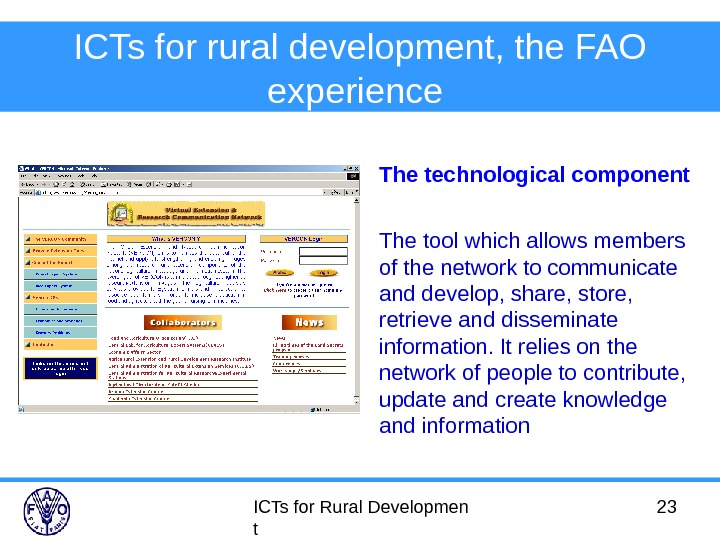

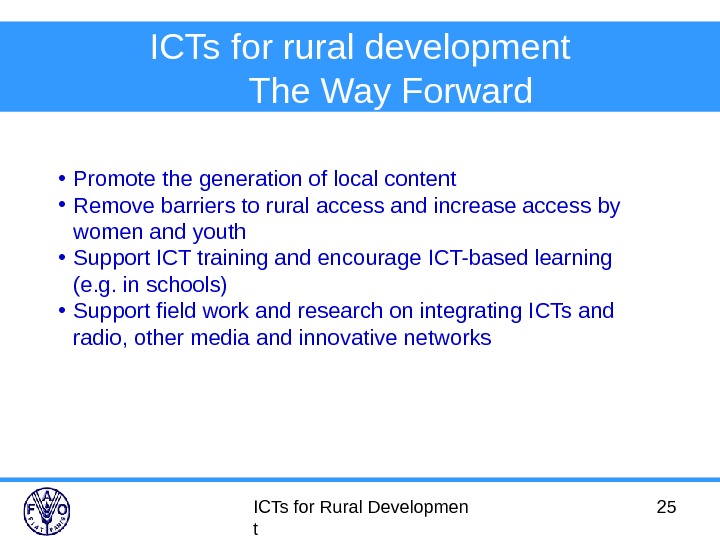
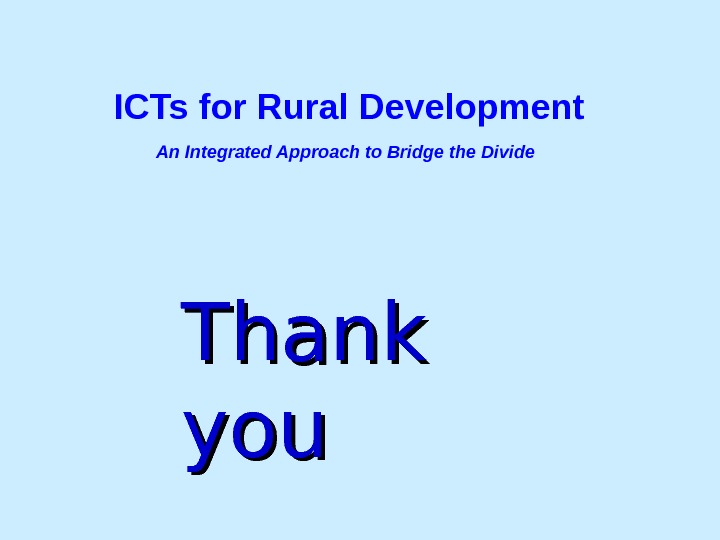

italy_icts_for_rural_development2.ppt
- Размер: 626.5 Кб
- Количество слайдов: 27
Описание презентации ICTs for Rural Development An Integrated Approach по слайдам
 ICTs for Rural Development An Integrated Approach to Bridge the Divide Riccardo del Castello Extension, Education and Communication Service Food and Agriculture Organization of the United Nations 16 th European Seminar on Extension Education
ICTs for Rural Development An Integrated Approach to Bridge the Divide Riccardo del Castello Extension, Education and Communication Service Food and Agriculture Organization of the United Nations 16 th European Seminar on Extension Education
 ICTs for Rural Developmen t 2 The Role of Media in Agricultural and Rural Development Media tools in the early days of development assistance • Radio, print, television, cinema – powerful instruments to reach the masses and teach new ways of thinking, new attitudes and techniques that would stimulate economic development New communication tools and shift in development thinking: • Participatory video • Rural Radio • Information and Communication Technologies
ICTs for Rural Developmen t 2 The Role of Media in Agricultural and Rural Development Media tools in the early days of development assistance • Radio, print, television, cinema – powerful instruments to reach the masses and teach new ways of thinking, new attitudes and techniques that would stimulate economic development New communication tools and shift in development thinking: • Participatory video • Rural Radio • Information and Communication Technologies
 ICTs for Rural Developmen t 3 The Role of Media in Agricultural and Rural Development ICTs for development — a difficult concept to grasp • Observation and measurement of ICTs potential is the most neglected in the area of policies and projects (OECD 2001) • Initial hype: a technological promise without consideration for the underlying social, economic, regulatory and cultural barriers. • Divergent models of technological adoption
ICTs for Rural Developmen t 3 The Role of Media in Agricultural and Rural Development ICTs for development — a difficult concept to grasp • Observation and measurement of ICTs potential is the most neglected in the area of policies and projects (OECD 2001) • Initial hype: a technological promise without consideration for the underlying social, economic, regulatory and cultural barriers. • Divergent models of technological adoption
 ICTs for Rural Developmen t 4 Knowledge and Information for Rural Development Sustainable agricultural development is based less on material inputs (e. g. , seeds and fertilizers) than on the people involved in their use. Knowledge and information are essential for empowering rural communities to more effectively influence local development. The challenge is to assist farmers to produce more food and secure the means to overcome food-insecurity and poverty. This calls for new technologies, skills, practices and ways to collaborate and, most of all, it requires that farmers have access to relevant information and knowledge.
ICTs for Rural Developmen t 4 Knowledge and Information for Rural Development Sustainable agricultural development is based less on material inputs (e. g. , seeds and fertilizers) than on the people involved in their use. Knowledge and information are essential for empowering rural communities to more effectively influence local development. The challenge is to assist farmers to produce more food and secure the means to overcome food-insecurity and poverty. This calls for new technologies, skills, practices and ways to collaborate and, most of all, it requires that farmers have access to relevant information and knowledge.
 ICTs for Rural Developmen t 5 The Information Age • New communication tools and channels • Information economy • Dramatic expansion in information technology and services • World-wide increase in the reach of mass media and electronic communication • New forms of social interaction, new relationships, new types of transactions • New economic opportunities and challenges
ICTs for Rural Developmen t 5 The Information Age • New communication tools and channels • Information economy • Dramatic expansion in information technology and services • World-wide increase in the reach of mass media and electronic communication • New forms of social interaction, new relationships, new types of transactions • New economic opportunities and challenges
 ICTs for Rural Developmen t 6 The Information Age: Threats and Opportunities • Building the information technology infrastructure • Social impact of Information and Communication Technologies on the lives of people • Content relevance and reliability • Language • Format. Rural Development in the Information Age: some issues
ICTs for Rural Developmen t 6 The Information Age: Threats and Opportunities • Building the information technology infrastructure • Social impact of Information and Communication Technologies on the lives of people • Content relevance and reliability • Language • Format. Rural Development in the Information Age: some issues
 ICTs for Rural Developmen t 7 The Information Age: Threats and Opportunities • Access — technological, educational, cultural • Training • North-South discussion: Is the technology narrowing or widening the knowledge gap between rich and poor communities • What about rural communities where basic access to telecommunication facilities is lacking? Rural Development in the Information Age: some issues
ICTs for Rural Developmen t 7 The Information Age: Threats and Opportunities • Access — technological, educational, cultural • Training • North-South discussion: Is the technology narrowing or widening the knowledge gap between rich and poor communities • What about rural communities where basic access to telecommunication facilities is lacking? Rural Development in the Information Age: some issues
 ICTs for Rural Developmen t 8 The Information Age: Threats and Opportunities Information Poverty • Information “haves (rich) ”and information “have nots (poor)” • Technology access will not put an end to poverty • People with access do not automatically move to the “rich”group The information revolution has bypassed nearly one billion rural people and exacerbated the existing differences. Digital Divide ——> Rural Digital Divide
ICTs for Rural Developmen t 8 The Information Age: Threats and Opportunities Information Poverty • Information “haves (rich) ”and information “have nots (poor)” • Technology access will not put an end to poverty • People with access do not automatically move to the “rich”group The information revolution has bypassed nearly one billion rural people and exacerbated the existing differences. Digital Divide ——> Rural Digital Divide
 ICTs for Rural Developmen t 9 The Information Age: Threats and Opportunities Total on-line: 606 million. People on-line. North Am erica, Wes tern Europe 62% As ia/Pacific 31% Res t of the World 2% Latin Am erica 5%
ICTs for Rural Developmen t 9 The Information Age: Threats and Opportunities Total on-line: 606 million. People on-line. North Am erica, Wes tern Europe 62% As ia/Pacific 31% Res t of the World 2% Latin Am erica 5%
 ICTs for Rural Developmen t 10 Rural Development in the Information Age • Potential for economic growth via inward and international investment • employment and income generation • Telecommunications, electricity are key utilities forming an integral part of development • Shift towards knowledge economies. Why are ICTs important?
ICTs for Rural Developmen t 10 Rural Development in the Information Age • Potential for economic growth via inward and international investment • employment and income generation • Telecommunications, electricity are key utilities forming an integral part of development • Shift towards knowledge economies. Why are ICTs important?
 ICTs for Rural Developmen t 11 Harnessing Knowledge for Development Need for new strategies involving different technologies and building on existing strengths. Information must be available in appropriate languages and formats, up-to-date and communicated through appropriate channels. Information intermediaries: a bridge between the information providers and the community members. Good intermediaries include proximity, trust and knowledge (extension workers, educators, radio broadcasters, community leaders)
ICTs for Rural Developmen t 11 Harnessing Knowledge for Development Need for new strategies involving different technologies and building on existing strengths. Information must be available in appropriate languages and formats, up-to-date and communicated through appropriate channels. Information intermediaries: a bridge between the information providers and the community members. Good intermediaries include proximity, trust and knowledge (extension workers, educators, radio broadcasters, community leaders)
 ICTs for Rural Developmen t 12 ICTs for rural development, the FAO experience A Communication for Development Approach: starting with the communities. Main objective: assist farmers in developing local communication processes through the use of media tools such as community radio, small format video and new ICTs. The communication for development approach provides development planners with a conceptual tool that puts rural people and rural organisations at the centre of any communication strategy design and in control of communication and information network development.
ICTs for Rural Developmen t 12 ICTs for rural development, the FAO experience A Communication for Development Approach: starting with the communities. Main objective: assist farmers in developing local communication processes through the use of media tools such as community radio, small format video and new ICTs. The communication for development approach provides development planners with a conceptual tool that puts rural people and rural organisations at the centre of any communication strategy design and in control of communication and information network development.
 ICTs for Rural Developmen t 13 ICTs for rural development, the FAO experience Enhance Information and Knowledge sharing among development actors. Communication for development rests on the premise that successful rural development calls for the conscious and active participation of the intended beneficiaries, especially women and the “poorest of the poor” at every stage of the development process. Communication for Development
ICTs for Rural Developmen t 13 ICTs for rural development, the FAO experience Enhance Information and Knowledge sharing among development actors. Communication for development rests on the premise that successful rural development calls for the conscious and active participation of the intended beneficiaries, especially women and the “poorest of the poor” at every stage of the development process. Communication for Development
 ICTs for Rural Developmen t 14 ICTs for rural development, the FAO experience Farmer Information Networks (Farm. Nets) A network operated by groups of farmers in collaboration with support services (agricultural research and extension, NGOs, input suppliers and marketing agents). ICTs linked to more conventional media (e. g. radio) as well as to interpersonal communication processes, such as farmer-to-farmer information exchange.
ICTs for Rural Developmen t 14 ICTs for rural development, the FAO experience Farmer Information Networks (Farm. Nets) A network operated by groups of farmers in collaboration with support services (agricultural research and extension, NGOs, input suppliers and marketing agents). ICTs linked to more conventional media (e. g. radio) as well as to interpersonal communication processes, such as farmer-to-farmer information exchange.
 ICTs for Rural Developmen t 15 ICTs for rural development, the FAO experience National Farmers Association Objectives: • Facilitate interactions for generating, gathering, adapting and exchanging agricultural information and knowledge. • Facilitate transactions for better, more productive farming.
ICTs for Rural Developmen t 15 ICTs for rural development, the FAO experience National Farmers Association Objectives: • Facilitate interactions for generating, gathering, adapting and exchanging agricultural information and knowledge. • Facilitate transactions for better, more productive farming.
 ICTs for Rural Developmen t 16 ICTs for rural development, the FAO experience Farm. Nets Benefits: Lower-cost inputs, improved transportation links, better crop storage arrangements, profitable negotiation with buyers. Access to local, regional, national and global agricultural information. A valuable tool for strategic planning and decision making by farmers and their organisations which can contribute to sustainable agricultural production
ICTs for Rural Developmen t 16 ICTs for rural development, the FAO experience Farm. Nets Benefits: Lower-cost inputs, improved transportation links, better crop storage arrangements, profitable negotiation with buyers. Access to local, regional, national and global agricultural information. A valuable tool for strategic planning and decision making by farmers and their organisations which can contribute to sustainable agricultural production
 ICTs for Rural Developmen t 17 ICTs for rural development, the FAO experience Linking Rural Radio to ICTs Information and knowledge systems are extremely effective when they are built on existing information systems and complemented by community intermediaries, institutions or individuals, who may act as a bridge between global networks and the communities. Radio is the most pervasive, accessible and affordable mass medium
ICTs for Rural Developmen t 17 ICTs for rural development, the FAO experience Linking Rural Radio to ICTs Information and knowledge systems are extremely effective when they are built on existing information systems and complemented by community intermediaries, institutions or individuals, who may act as a bridge between global networks and the communities. Radio is the most pervasive, accessible and affordable mass medium
 ICTs for Rural Developmen t 18 ICTs for rural development, the FAO experience Linking Rural Radio to ICTs Rural Radio functions: • rapid diffusion of development information to remote geographical areas • channel for interactive communication, dialogue and debate on major rural development issues. • a tool for cultural expression, entertainment. • A platform for democratic expression of opinions, needs and aspirations of rural communities
ICTs for Rural Developmen t 18 ICTs for rural development, the FAO experience Linking Rural Radio to ICTs Rural Radio functions: • rapid diffusion of development information to remote geographical areas • channel for interactive communication, dialogue and debate on major rural development issues. • a tool for cultural expression, entertainment. • A platform for democratic expression of opinions, needs and aspirations of rural communities
 ICTs for Rural Developmen t 19 ICTs for rural development, the FAO experience The Virtual Extension, Research and Communication Network (VERCON) Weak linkages between extension and research are a documented global problem and often result in systematic knowledge and information «bottlenecks» and limit the effectiveness of research to contribute to agricultural development.
ICTs for Rural Developmen t 19 ICTs for rural development, the FAO experience The Virtual Extension, Research and Communication Network (VERCON) Weak linkages between extension and research are a documented global problem and often result in systematic knowledge and information «bottlenecks» and limit the effectiveness of research to contribute to agricultural development.
 ICTs for Rural Developmen t 20 ICTs for rural development, the FAO experience The Virtual Extension, Research and Communication Network (VERCON) A conceptual model that employs Internet-based ICTs to strengthen linkages among agricultural policy, research and extension institutions and individuals.
ICTs for Rural Developmen t 20 ICTs for rural development, the FAO experience The Virtual Extension, Research and Communication Network (VERCON) A conceptual model that employs Internet-based ICTs to strengthen linkages among agricultural policy, research and extension institutions and individuals.
 ICTs for Rural Developmen t 21 ICTs for rural development, the FAO experience The VERCON’s innovative nature is its capability to achieve effective linkages by connecting geographically dispersed people and enhance two-way communication, managing large volumes of data, and rapidly collecting, processing and dispersing information in a variety of forms. The VERCON concept consists of two fully-integrated and inter-dependent components; the human and the technological.
ICTs for Rural Developmen t 21 ICTs for rural development, the FAO experience The VERCON’s innovative nature is its capability to achieve effective linkages by connecting geographically dispersed people and enhance two-way communication, managing large volumes of data, and rapidly collecting, processing and dispersing information in a variety of forms. The VERCON concept consists of two fully-integrated and inter-dependent components; the human and the technological.
 ICTs for Rural Developmen t 22 ICTs for rural development, the FAO experience The human component A network of policy-makers, research and extension workers, academics, NGOs and farmers, committed to collaboration, communication and supporting agricultural producers
ICTs for Rural Developmen t 22 ICTs for rural development, the FAO experience The human component A network of policy-makers, research and extension workers, academics, NGOs and farmers, committed to collaboration, communication and supporting agricultural producers
 ICTs for Rural Developmen t 23 ICTs for rural development, the FAO experience The technological component The tool which allows members of the network to communicate and develop, share, store, retrieve and disseminate information. It relies on the network of people to contribute, update and create knowledge and information
ICTs for Rural Developmen t 23 ICTs for rural development, the FAO experience The technological component The tool which allows members of the network to communicate and develop, share, store, retrieve and disseminate information. It relies on the network of people to contribute, update and create knowledge and information
 ICTs for Rural Developmen t 24 ICTs for rural development The Way Forward • Work with government, private sector & civil society to influence ICT policy/regulatory environment and ensure affordable access • Involve all stakeholders and promote bottom up local participation and demand-led approaches • Encourage decentralized and flexible control of resources • Build on and strengthen local appropriation of ICTs and support local entrepreneurs
ICTs for Rural Developmen t 24 ICTs for rural development The Way Forward • Work with government, private sector & civil society to influence ICT policy/regulatory environment and ensure affordable access • Involve all stakeholders and promote bottom up local participation and demand-led approaches • Encourage decentralized and flexible control of resources • Build on and strengthen local appropriation of ICTs and support local entrepreneurs
 ICTs for Rural Developmen t 25 ICTs for rural development The Way Forward • Promote the generation of local content • Remove barriers to rural access and increase access by women and youth • Support ICT training and encourage ICT-based learning (e. g. in schools) • Support field work and research on integrating ICTs and radio, other media and innovative networks
ICTs for Rural Developmen t 25 ICTs for rural development The Way Forward • Promote the generation of local content • Remove barriers to rural access and increase access by women and youth • Support ICT training and encourage ICT-based learning (e. g. in schools) • Support field work and research on integrating ICTs and radio, other media and innovative networks
 ICTs for Rural Development An Integrated Approach to Bridge the Divide Thank youyou
ICTs for Rural Development An Integrated Approach to Bridge the Divide Thank youyou
 ICTs for Rural Developmen t
ICTs for Rural Developmen t

